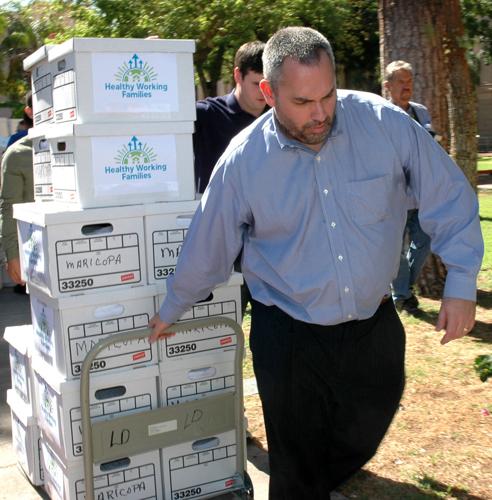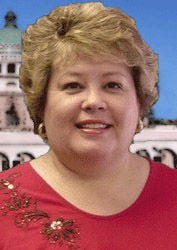In Tucson this week, Arizona Secretary of State Michele Reagan spoke soothing words to a gathering of county recorders and election officials.
“My office has absolutely no interest in going into the voter-registration business,” she said Wednesday at the Omni Tucson National Resort. “We believe all of the editing of the data files, the adding to the data files is something that belongs to the county recorders. We are not interested in doing that part of the job.”
Reagan was trying to defuse a volatile conflict between her and the 15 elected recorders, especially the two from Pima and Maricopa counties. But the words came too late, about three weeks too late.
You may recall that back in January the recorders sent a joint letter to Reagan demanding better communication with her office, especially with her elections director, Eric Spencer. Months passed, more letters were exchanged, many of them dealing with a proposed statewide voter-registration system. The Secretary of State’s Office is preparing a request for proposals on such a system now, although Arizona’s two most populous counties, Pima and Maricopa, operate their own, separate systems.
Then, on March 20, Reagan sent a letter to the Arizona Attorney General’s Office. It asked the office to answer several key questions, among them:
“Does federal and state law allow Arizona counties to maintain separate, county-based voter-registration databases?”
“Under federal and state law governing public records and voter-registration information, is the secretary of state permitted to decline to fulfill a proper request for voter registration information and instead direct the requester to seek that information from each individual county?”
These may sound like sensible questions to outsiders. But they landed like a grenade in the middle of the tense relationship between the recorders and secretary of state. Most importantly, Reagan said nothing to the recorders about the idea of requesting an opinion from the attorney general until April 4, two weeks after she had done it.
So much for improved communication!
On April 6, the longtime Pima County Recorder F. Ann Rodriguez sent Reagan a fiery response:
“Your email states it was sent as part of your ‘ongoing commitment to improve communications’ between your office and ours. However, your email in reality provided us with notice that you have made a formal request to the Arizona Attorney General’s Office questioning the legality of the Pima County and Maricopa County voter-registration systems, which have been in operation for many years under several former secretaries of state.”
This is the heart of the controversy between the recorders and Reagan. The Secretary of State’s Office helps operate a 13-county voter-registration system, but the state’s two most populous counties run their own systems, which they’ve spent millions of dollars to update.
“I would love it if all the counties were on the same system, however I fully acknowledge that that is probably not the way it’s going to be,” Reagan said Wednesday. “That’s OK, as long as we can be sure they read each other properly.”
Rodriguez has been especially guarded in keeping information from the Secretary of State’s Office. She hasn’t provided, for example, the “street file” of mapping information that would allow voters to search the secretary of state’s website to find out where to vote in Pima County. For that information, you have to go to the Pima County recorder’s website.
Rodriguez told me she was concerned that Spencer, the elections director, was planning to share it with a third-party vendor.
“Pima County has spent millions of dollars over the years enhancing our voter-registration system on behalf of the citizens of Pima County,” she told me in an email. “This included our web page, too. Our system works and (Reagan) wants us to use an off-the-shelf product that is not specifically designed for the state of Arizona.”
Possible McSally challenger
A one-time contender for Congress from Tucson is looking at the possibility of running again. Jeff Latas, now 59, ran for the Democratic nomination for Congress in southeastern Arizona back in 2005-2006. Gabrielle Giffords defeated him.
Now Rep. Martha McSally, a Republican, represents the district running from central Tucson southeast to the borders of New Mexico and Sonora. Like McSally, Latas is a U.S. Air Force veteran and served in combat in Iraq in the 1990s.
“A Trump candidacy and presidency has driven me to the point that I needed to do something,” Latas said. “I think I would stand fairly well against McSally, considering my background.”
Latas formed an exploratory committee and remains truly undecided about whether he’ll run, he said. He’ll decide in part based on factors such as fundraising and who else enters the race in the Democratic-leaning district.
McSally funding up
Whoever runs against McSally will undoubtedly be facing a well-funded candidate. McSally’s campaign reported in an email that it took in nearly $750,000 and has about $630,000 in cash on hand. The fundraising figure was better than in the same period of 2015, the last non-election year.
McSally will undoubtedly be supplemented by significant outside spending, too. In 2016, outside groups spent about $770,000 to help her beat Democrat Matt Heinz, although he never seemed close to beating her.







